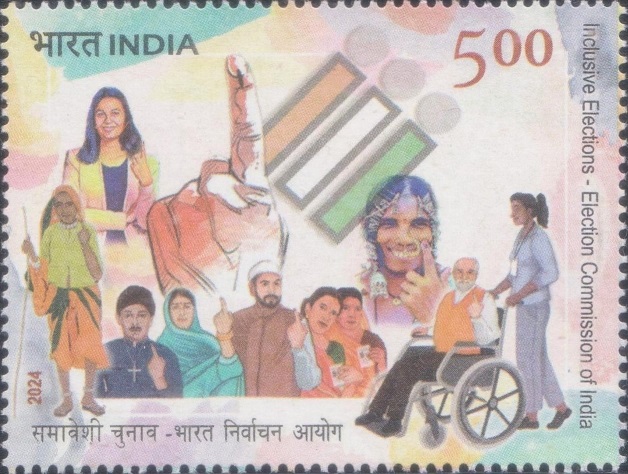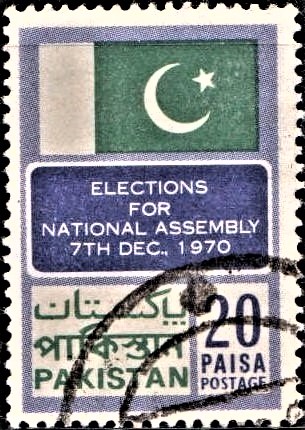
Inclusive Elections – Election Commission of India
A commemorative postage stamp on Inclusive Elections in India, held by Indian Election Commission (ECI), a constitutional body established by Indian Constitution :
 Issued by India
Issued by India
Issued on Jan 25, 2024
Issued for : Acknowledging the ECI’s pivotal role, the Department of Posts is delighted to issue a commemorative postage stamp on ‘Inclusive Elections in India’ and recognises ECI’s contributions to ensuring equitable elections, encouraging voter participation, and preserving the democratic system.
Credits :
Stamp/FDC/Brochure/Cancellation Cachet : Ms. Gulistaan
Type : Stamp, Mint Condition
Colour : Multi Colour
Denomination : 500 Paise
Stamps Printed : 301680
Printing Process : Wet Offset
Printer : Security Printing Press, Hyderabad
About :
- The Election Commission of India is an independent constitutional body responsible for conducting and overseeing elections of the Largest Democracy of the world. Its impartial role is instrumental in upholding the fairness and integrity of the electoral process. The Commission’s meticulous planning and execution of elections ensure that the elections are free and fair, reinforcing public trust and confidence.
- Article 324, which created the Election Commission, holds exceptional significance. The Constitution was adopted by the Constituent Assembly on November 26, 1949 and put into effect on January 26, 1950. The Election Commission’s office was established on January 25, 1950, a day before the Constitution became effective. It placed its trust in the wisdom of Indian citizens to choose their representatives in positions of authority.
- India’s democracy thrives on its diversity – cultural, social, geographical, linguistic, etc. This diversity is seamlessly integrated into the political and social fabric of the nation, fostering a unique blend of unity in diversity. One of the fundamental tenets of Indian democracy is universal suffrage. The Indian Constitution grants all adult citizens the right to vote, regardless of their caste, religion, gender, or socio-economic status. This inclusive approach ensures that every individual has a say in shaping the nation’s destiny, reinforcing the notion of seamless integration within the diverse Indian population.
- Today, the Election Commission stands as a cornerstone of democracy in the world’s largest democratic nation. Having conducted 17 General Elections and over 400 Assembly elections, the ECI presently manages a diverse electorate of over 96 Crore voters, comprising roughly 49.68 Crore male and 47.07 Crore female voters, reflecting a balanced gender distribution. The count also includes about 48,000 individuals who identify as the third gender, highlighting the inclusivity of the enrolment process. Additionally, there are about 81.22 lakh voters with disabilities (PwD). The age range among voters is diverse, with approximately 1.84 Crore aged 80 and above and 2.55 lakh surpassing the age of 100. The 18-19 age group boasts approximately 1.85 Crore of new voters, enriching India’s democratic tapestry. With a commitment to inclusivity, the Commission encourages the participation of young voters through initiatives like National Voters Day (NVD) and extensive awareness campaigns.
- As the 18th General Elections – 2024 are around the corner, ECI has launched an array of initiatives to make the election “inclusive, accessible and participative” in its truest spirit. Targeted campaign such as ‘Desh ka Form’ during Special Summary Revision-2024, National Voter’s Awareness Contest, Cycle Rallies and Democracy rooms for new and first-time voters, Turnout Implementation Plan for targeting each polling booth, Matdata Junction radio programme series, all aimed at fostering participation from every section of the society. This commitment is evident in spearheading efforts for 100% participation of Particularly Vulnerable Tribal Groups, along with targeted interventions for women, first-time voters, tribal groups, and Persons with Disabilities. Creating permanent Assured Minimum Facilities (AMF) is given due prominence to enhance the voter experience, making voting more accessible and convenient for citizens. Additionally, the special initiative of Home Voting, which allows eligible voters with physical disabilities, illnesses, or advanced age to cast their votes from their homes, serves to emphasise the importance of every vote.
- Various divisions of the Commission work in tandem to facilitate, educate and engage with voters. Technological advancements, such as the transition to Electronic Voting Machines (EVMs) and the introduction of Voter Verifiable Paper Audit Trail (VVPAT), have enhanced transparency in elections. To combat misinformation and empower voters to make informed decision, ECI has implemented a ‘fact-check’ register, chatbots for officials, and digitalized content. The commitment to technological advancements is evident in the development and regular updates of apps for all stakeholders like c-Vigil, Know Your Candidate App, Saksham App, Voter Helpline App, Suvidha App, etc.
- The establishment of the “India International Institute of Democracy and Election Management” (IIIDEM) showcases the ECI’s dedication and commitment to sharing expertise and experience with Election Management Bodies (EMBs) in other countries, providing electoral assistance and training based on bilateral requests and multilateral arrangements to around 140 Nations.
- Text : Based on information received from proponent.







